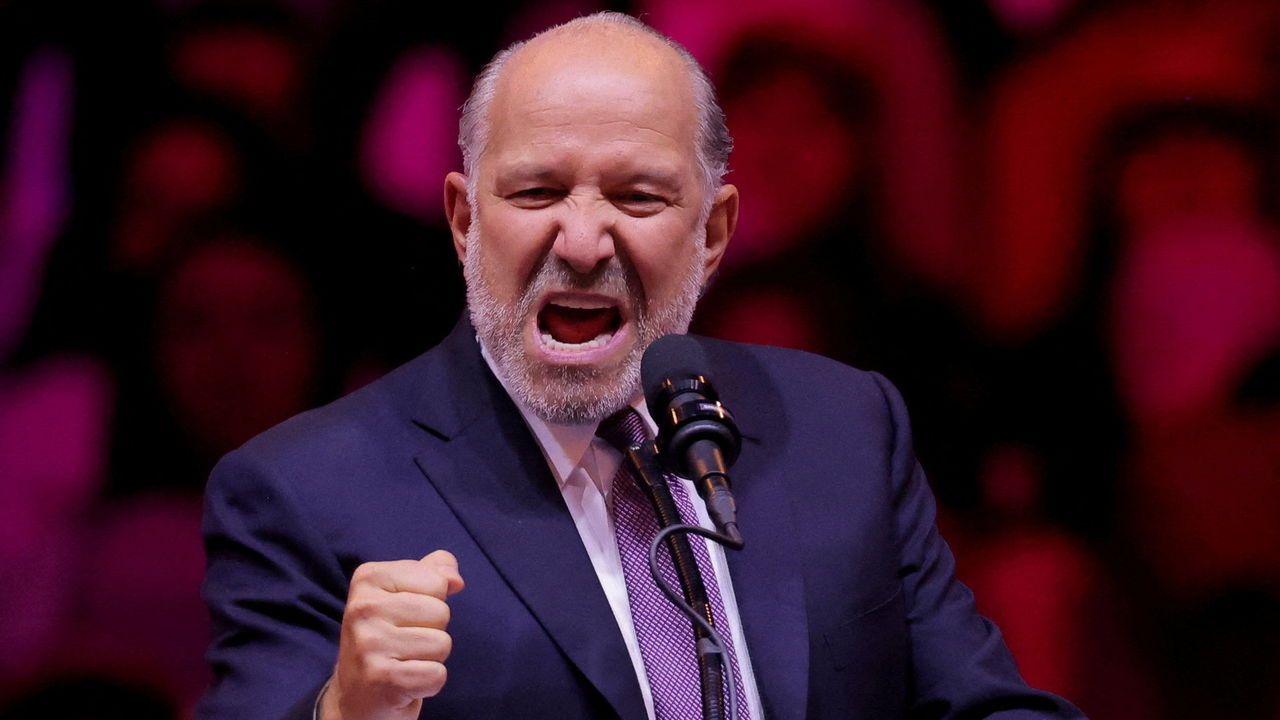- by
- 01 30, 2025
-

-
-
Loading

Loading

HOWARD LUTNICKMAGAMAGA is a brawler and a bawler. He owes his multi-billion-dollar fortune—his life, really—to luck and grit. The sharp-elbowed striving that made his career might desensitise other men. But Mr Lutnick also knows pain and he knows tragedy; they have walloped him and reduced him to tears on national television. They have also given him purpose.The defining event of Mr Lutnick’s life was 9/11. Two-thirds of his employees—including his own brother—died that day. The headquarters of his company, Cantor Fitzgerald, were in the World Trade Centre. After the attacks he became a fighter for his firm and his city. Disaster brought struggle, then redemption.Decades later the fight for Mr Lutnick, now aged 63, is over the fate of America itself. The man in the ring is another big-city billionaire, Donald Trump. In this bout, Mr Lutnick is so far more of a towel boy, a cheerleader or a coach. Once a donor to Mr Trump, he is managing the president-elect’s transition, filling roughly 4,000 government posts before the inauguration—the perfect role for someone who has described himself as “addicted to people”. In return he might be rewarded with the job of treasury secretary.“You’re going to see the greatest set of talent, ever, walk on the field on January 20th,” he has promised. Yet his boss prizes loyalty over talent. Mr Lutnick’s boast predated a series of alarming nominations: for attorney-general, at the Pentagon, for health and human services. This suggests his influence has limits, or that he is overseeing less prominent and provocative appointments. Mr Lutnick has long advised hiring friends, but only the conscientious and capable ones. If Mr Trump heard that rider, he ignored it.Mr Lutnick grew up in a middle-class family on Long Island, the son of an art teacher and a history professor. Misery came quick. When he was 16 his mother died of cancer. Then during his first week of university his father, also sick with cancer, was given the wrong dose of medicine by hospital staff and died. The loss of both parents, he said, left him and his siblings like astronauts on a spacewalk: tethered to each other, adrift from everyone else.A family friend got him a job at Cantor Fitzgerald, then one of the largest brokers of Treasuries. Success also came quickly. A series of profitable trades endeared him to Bernie Cantor, the boss. Mr Lutnick would later describe his ascent like this: “The first time I made him $100m, he liked me; the second time I made him $100m, he loved me; and the third time I did it—family.” At the age of 29 he became president of the firm.When Cantor became terminally ill, a nasty dispute ensued between his wife, Iris, and Mr Lutnick over control of the firm. When they finally settled in Delaware’s court of chancery, Mr Lutnick held up his six-day-old baby in triumph. He felt like Mufasa, the father in “The Lion King”. Mrs Cantor barred him from the funeral. But he had won.Working on the 105th floor of the World Trade Centre’s north tower was, for a time, a dream. Outside one window was the Statue of Liberty’s “armpit”; outside the other, Manhattan as if on a postcard. His colleagues were family. That was the ethos of the firm: hire friends, brothers-in-law, brothers. It turned into a nightmare on that Tuesday morning in 2001. Mr Lutnick was spared by sheer luck. He was dropping his son at kindergarten when the towers were hit; 658 of his employees died.Mr Lutnick cried every day for three years, even in one television interview after another. At first the press empathised with him and lionised him. But within days they started “ripping” him for not sending pay-cheques to the families of dead employees. He was called heartless, duplicitous, media-hungry, full of “crocodile tears”. There was no other option, he insisted: “It was just math…There simply was no money.” For the next five years he diverted a quarter of his remaining employees’ salaries to a relief fund for victims’ families. With time, the firm thrived. His employees “stitched [his] soul back together”.In his embrace of , Mr Lutnick mythologises American workers trampled by globalisation. “Tariff the rest of the world and keep them the heck out,” he has said. That populist guff sounds discordant coming from the owner of the penthouse in the Pierre Hotel in New York. More relevant to Mr Lutnick is the prospect of tax cuts and crypto deregulation under Mr Trump. Mr Lutnick says he owns “hundreds of millions of dollars” in bitcoin; he rhapsodises about the time when America had no income tax. Censorious liberals were part of his conversion, too. In 2022 he engineered the public listing of Rumble, a YouTube for the far right, to give a platform to figures deemed too odious for Big Tech. “This is the free-speech internet coming back,” he said at the time. “We just want the America that we grew up in.”Mr Lutnick has said he will judge prospective hires in the Trump administration by their capacity, as well as their “fidelity and loyalty…to the man”. Mr Lutnick’s most impressive talent is his ability to imbue staff with a sense of mission. But that is only as worthwhile as the quality of the staff and of the mission itself.